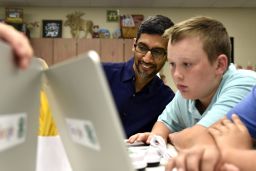Google CEO Sundar Pichai grew up in Chennai, India, with little access to a phone – let alone a computer or the internet. But it was this upbringing that helped show him just how powerful technology could be.
The Pichai family waited five years before they could get a telephone. When they did, neighbors would come over to make calls.
“It became a communal thing. People would come to call their kids,” Pichai told CNN’s Poppy Harlow in an exclusive interview for a new episode of Boss Files. “And so for me, it showed the power of what’s possible with technology.”
Pichai wouldn’t own a dedicated computer until he moved to the United States and attended Stanford University on a scholarship. But then the rest was history.
He graduated from Stanford with a master’s in engineering and later went on to get an MBA from the Wharton School at the University of Pennsylvania.
Pichai worked at Applied Materials and McKinsey before joining Google in 2004. There, he held a variety of roles, including overseeing Chrome, product chief of Google and head of the Android operating system. He became CEO in 2015.
Watch the full interview with Google CEO Sundar Pichai
When asked if he believes the American dream is still alive, Pichai said he still thinks America is a “land of opportunity.”
“I still think that’s true today,” he said. “But I think we need to work hard to make sure it is true.”
A big part of that is ensuring immigrants have a path to succeed.Pichai has called on Congress to protect Dreamers and has advocated for high-skilled immigration.

“If you look at the technology industry … at all the leading companies, many of them were founded by immigrants,” he said. “Our leadership in technology comes from our ability to attract the best computer scientists, AI researchers. I think it’s important that we continue to do that.”
Becoming CEO of Google was the “opportunity of a lifetime,” Pichai said. But it wasn’t something he asked for. He said he was surprised when Google cofounders Larry Page and Sergey Brin approached him about it.
“I was busy building products. And I quite didn’t anticipate where this would go,” he said.
In his role, Pichai has faced some serious challenges, including concerns about user privacy, gender and diversity issues at the company and employee walkouts. He has also testified on Capitol Hill about privacy, and could face a possible US antitrust probe into his company.
“It’s the job of the CEO to be chief ethics officer, given the scale at which technology impacts society,” he said. “I view it as a fundamental part of my role. But I think ethics needs to come at all layers of the organizations.”
As people become more concerned about data privacy, Pichai said Google is looking at ways to make it easier for users to minimize their information and have more control over their data.For example, the company recently announced a way for users to auto-delete their location history and web browsing activity.
“I don’t think users have a good sense for how their data is being used,” he said. “We’ve put the burden on users to a large extent.”

Pichai is also tackling challenges within the company. Last year, Google employees around the world staged walkouts to protest what they say is a workplace culture that has turned a blind eye to sexual harassment and discrimination.
Pichai said he believes the walkouts made Google a better company.
“Our employees clearly spoke up at a moment when the company hadn’t gotten it right,” he said. “I think it’s a good part of our culture that we were able to acknowledge something publicly and then work hard to get things better.”
He said one of the most important decisions the company made as a result was ending the requirement for forced arbitration. However, some organizers of the walkout have said they felt retaliation from the company. One of the organizers left Google earlier this month.
“When you run a company at scale, it’s extremely important to me that there is no retaliation at the company. I take it very seriously,” Pichai said. “We have very rigorous processes with multiple levels of oversight on something like that, which is important.
Pichai said women should have a “very inclusive” experience when they’re at work
“It’s about investing in them, in their career development and supporting their work experience all the way through,” he said.
However, Google has more work to do to increase the number of women in its workforce and in high-level positions. According to its most recent diversity report, women made up about 33% of overall roles at Google, and just over a quarter of leadership positions.
In 2017, Google employee James Damore, who was later fired,wrotea controversial memo critiquing Google’s diversity policies. Parts of the memo were condemned by Pichai, such as claims that women aren’t well represented in tech due to “biological” reasons. Damore, and another former engineer, sued Google for discrimination.
Pichai said the most important lesson he’s learned at Google is to hear the perspectives of other people.
“What you think internally, alone, is not enough,” he said. “You have to hear perspectives from the outside and you have to be open to what’s going on around you, [to] understand the impact of your products, and learn and work hard to make that better.”















